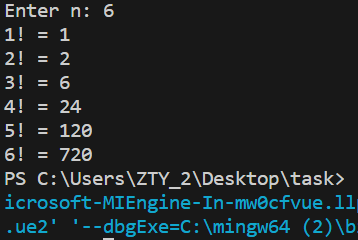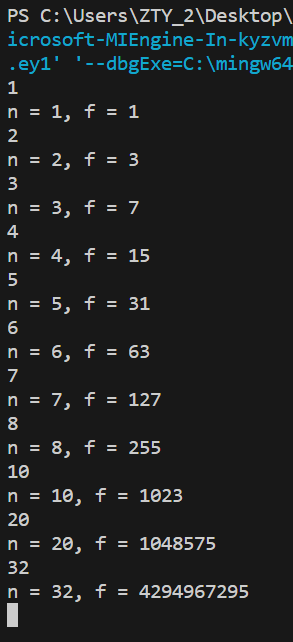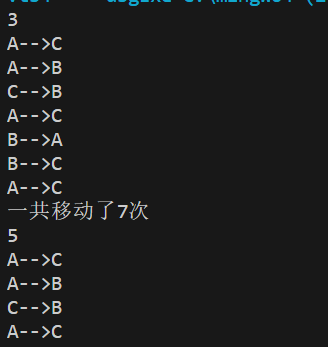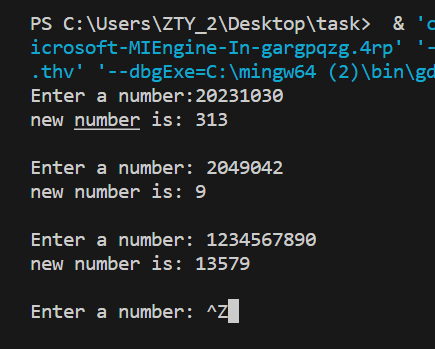task1
代码
#include <stdio.h> #include <stdlib.h> #include <time.h> #include <windows.h> #define N 80 void print_text(int line, int col, char text[]); // 函数声明 void print_spaces(int n); // 函数声明 void print_blank_lines(int n); // 函数声明 int main() { int line, col, i; char text[N] = "hi, November~"; srand(time(0)); // 以当前系统时间作为随机种子 for (i = 1; i <= 10; ++i) { line = rand() % 25; col = rand() % 80; print_text(line, col, text); Sleep(1000); // 暂停1000ms } return 0; } // 打印n个空格 void print_spaces(int n) { int i; for (i = 1; i <= n; ++i) printf(" "); } // 打印n行空白行 void print_blank_lines(int n) { int i; for (i = 1; i <= n; ++i) printf("\n"); } // 在第line行第col列打印一段文本 void print_text(int line, int col, char text[]) { print_blank_lines(line - 1); // 打印(line-1)行空行 print_spaces(col - 1); // 打印(col-1)列空格 printf("%s", text); // 在第line行、col列输出text中字符串 }
截图

task2_2
代码
// 利用局部static变量的特性,计算阶乘 //汉诺塔 #include <stdio.h> long long fac(int n); // 函数声明 int main() { int i, n; printf("Enter n: "); scanf("%d", &n); for (i = 1; i <= n; ++i) printf("%d! = %lld\n", i, fac(i)); return 0; } // 函数定义 long long fac(int n) { static long long p = 1; p = p * n; return p; }
截图

task2_2
代码
// 练习:局部static变量特性 #include <stdio.h> int func(int, int); // 函数声明 int main() { int k = 4, m = 1, p1, p2; p1 = func(k, m); // 函数调用 p2 = func(k, m); // 函数调用 printf("%d, %d\n", p1, p2); return 0; } // 函数定义 int func(int a, int b) { static int m = 0, i = 2; i += m + 1; m = i + a + b; return m; }
截图

task3
代码
#include <stdio.h> long long func(int n); // 函数声明 int main() { int n; long long f; while (scanf("%d", &n) != EOF) { f = func(n); // 函数调用 printf("n = %d, f = %lld\n", n, f); } return 0; } long long func(int n) { int s; long long p=1,t=0; for(s=1;s<=n;s++) p=2*p; t=p-1; return t; }
截图

task4
递归
代码
#include <stdio.h> int func(int n, int m); int main() { int n, m; while(scanf("%d%d", &n, &m) != EOF) printf("n = %d, m = %d, ans = %d\n", n, m, func(n, m)); return 0; } int func(int n,int m) { if(n == m || m == 0 ) return 1; if(m == 1) return n; if(n == 0 || m>n) return 0; else return func(n-1,m) + func(n-1, m-1); }
截图

递归
代码
#include <stdio.h> int func(int n, int m); int main() { int n, m; while(scanf("%d%d", &n, &m) != EOF) printf("n = %d, m = %d, ans = %d\n", n, m, func(n, m)); return 0; } int func(int n,int m) { int i,t,sum,N,M; N=n; M=m; for(i=1;i<=m-1;i++) N=N*(n-i); for(t=1;t<=m-1;t++) M=M*(m-t); sum=N/M; return sum; }
截图

task5
代码
#include <stdio.h> int i= 1; void move(char x, char y) { i++; printf("%c-->%c\n",x,y); } void hanoi(int n, char one, char two, char three) { if(n==1) move(one, three); else { hanoi(n-1, one, three, two); move(one, three); hanoi(n-1, two, one, three); } } main() { int m; while(scanf("%d",&m)!=EOF) { hanoi(m,'A','B','C'); printf("一共移动了%d次\n",i-1); } }
截图

task6
代码
#include <stdio.h> #include<math.h> long func(long s); int main(){ long s,t; printf("Enter a number:"); while(scanf("%ld",&s)!=EOF){ t=func(s); printf("new number is: %d\n\n",t); printf("Enter a number: "); } return 0; } long func(long s){ int x,t=0; while(s!=0){ x=s%10; s/=10; if(x%2!=0) t=t*10+x; } while(t!=0){ x=t%10; t/=10; s=s*10+x; } return s; }
截图





 浙公网安备 33010602011771号
浙公网安备 33010602011771号